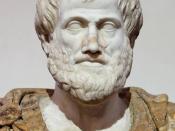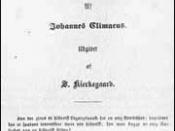What evidence of truth do you need to except a clam, be it moral, religious, philosophical, ect. Do you distinguish between these, if so why and how?
"There are no new truths, but only truths that have not been recognized by those who have perceived them without noticing. A truth is something that everybody can be shown to know and to have known, as people say, all along," Mary McCarthy. I believe that someone can recognize the truth without having physical evidence to prove it, just by their intuition.
In a case where there is not physical evidence to support a claim, the only evidence would then be logic. Take Zeno's Paradoxes for example. The idea that movement does not occur and that our senses are unreliable seems absurd to me. Even though I can not prove it to be false, I can not except it even with the evidence presented.
It is obviously ridiculous because it offends either our reason or our common sense. However, I can not prove my senses to be accurate, but I do rely on them the majority of the time. I believe it is a natural truth. When a claim is logical and I am able to relate a reasonable effect to the cause, I can ponder its truth.
The question I believe a philosopher would ask is -- how would someone discern between a natural truth and a learned truth. A learned truth being something tought and excepted without question, for example -- many people believed that the world is flat, or in the case of religion, there is a God. This would be very difficult in moral claims. For example, how would you punish someone accused of murder? In some cultures just the accusation is cause for execution, an eye for...


